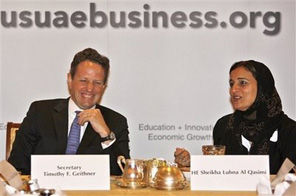US treasury chief in UAE to drum up support
ABU DHABI: U.S. Treasury Secretary Timothy Geithner, looking to win backing from oil-rich Gulf Arab nations, said Wednesday that Washington wants to work with its allies to build a stronger financial foundation for the world as it emerges from its worst recession in decades.
Geithner's comments followed a closed-door breakfast meeting with United Arab Emirates Foreign Trade Minister Sheikha Lubna al-Qasimi and other officials from the Arab world's second largest economy. The talks in the UAE's federal capital, Abu Dhabi, focused on education and economic development.
"We of course want to not just address the immediate causes of the financial crisis," Geithner said after the meeting. "We want to rebuild a stronger foundation for more balanced growth globally."
The meeting marked the start of the second of a two-day visit with Arab Gulf leaders a high profile trip in which he met a day earlier with Saudi Arabia's King Abdullah and businessmen in the kingdom. The UAE, which is the end of the Mideast tour, is also home to the Persian Gulf commercial and financial hub, Dubai.
A key aim of the trip, which follows a series of overtures to the Middle East by President Barack Obama, is to reassure major oil producers in the six-nation Gulf Cooperation Council that America still welcomes their business and will safeguard the value of the dollar and their vast U.S. investments by forging a way out of the financial crisis.
"The UAE and the GCC countries have played an important stabilizing role (in the global economy). You've seen them intervene in support of U.S. banking institutions," said Nasser Saidi, chief economist of the Dubai International Financial Center. "What we need to see is a recognition of the important role of the GCC on the international level."
The Gulf states' wealth skyrocketed during oil's earlier boom years, adding to their political clout in the process. But leaders in the region have grown increasingly concerned in recent months as crude prices and the value of their investments soured.
Five of the Gulf Cooperation Council nations — Saudi Arabia, the UAE, Oman, Bahrain and Qatar peg their currency to the dollar. Kuwait uses a basket of currencies that includes the greenback.
As a group, Gulf governments hold more than $400 billion worth of U.S. investments, making them second only to China as America's biggest creditor, Saidi said.
"Income from foreign assets in terms of investment positions is becoming as important as income from oil. People tend to forget that," Saidi said.
Later Wednesday, Geithner is due to meet with the UAE's crown prince, as well as the head of the central bank and the country's deputy finance minister.
He is also scheduled to speak with officials from some of the sheikdom's sovereign wealth funds, which have invested billions of dollars in U.S. companies such as Citigroup Inc. From the UAE, he heads to Paris.
"Gulf countries are very important as investors, even though they don't have that much money to spend this year" because of lower oil prices, said Eckart Woertz, program manager for economics at the Gulf Research Center in Dubai. "That's a large part of why he's coming."






